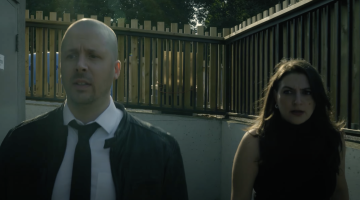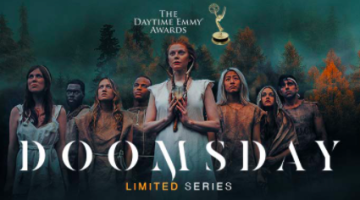It was late 2009 and I had worked on a number of independent projects in every role but the one I was actually seeking and had went to school for. Through an odd combination of right place, right time, wrong skill on display, I was being hired to run production sound from one project to the next.
I like production sound, but more importantly, I understand the value of having the right person dedicated to that often under appreciated role, but it just wasn’t my passion.
However, it was through this journey that I met Chris Jackson, who was the lead actor in the independent feature production called, ‘Brainjacked.’ Andy Lalino, the project’s producer, hired me to come on board their project after meeting him on another set where I was operating boom.
Not too long after wrapping on Brainjacked, I got a call about a script that Chris had written and that’s when I first met Jessica Alexander, who was producing the project, ‘Past the Fields.’
They were looking for a director of photography, it was a feature film, and it was actually what I wanted to do. The story of Past the Fields is an article in itself, but my purpose in naming it here is to tell you what I saw in how the actors handled the work. To say the script was dialogue heavy is an understatement and that’s not a criticism so much as a worry I had at the start of the production about just how we were going to shoot all of it with the kind of production it was.
We’re based in Florida, working an independent project, and that meant that a lot of the talent and crew had day jobs. Some of the talent were theatre actors, which usually meant they were either in a play, or preparing for their next one, on top of that day job. Shooting occurred mainly on nights and weekends and, as said, this was a feature and we weren’t looking to shoot for 6 months.
What I learned in watching these actors work changed the way I would approach auditions for my own projects. I, like Chris, can have a heavy hand when it comes to dialogue and I tend to write in a style that does not necessarily fall off the tongue in the usual fashion. Plainly said, I tend to have characters spout off into long monologues, brimming with weirdness and I am not in the camp that is OK with the actor getting it “close” enough.
I want actors to know their lines and I don’t want to lament the fact in the editing room that they changed every other word. So I need to find cast that can give me what I need quickly, know their lines, and won’t gobble up precious minutes and hours of the day struggling with their lines and performances.
Prior to my Past the Fields experience, I would hold general auditions, go through the list of potential candidates and “hope” I found the right people. More often, I would face a decision at the end of the day of who I liked the most of the group, and not choosing between who I loved from the group. Past the Fields is where I learned how invaluable it is to become good friends with people who really know the local theatre community.
Jessica Alexander was that person for me. Being an actor herself and knowing all the insiders in the community, she became my first stop when I had finished writing a science fiction web series called, ‘Time Keeper,’ and wanted to find just the right people who could take on the roles the way I envisioned them.
What had been a somewhat harrowing experience in hoping to meet those people in a blind audition, became what I call a nice night out. We picked a night, and spent a few hours talking about the different characters, did a few quick exercises like, “If you could cast anyone in hollywood, without restriction, who would you pick”, and I watched as she clicked through a few websites and generated a short list of head shots from local productions and listened to some real world, first hand experience.
With the help of a laptop, she gave me a short list of, “here’s who I think would be great for that” and here’s a link to a performance they gave last month showcasing something like that. Literally in a night, I had a “short list” of potentials and could go about setting up interviews to complete the search.
Many times during the production of Time Keeper, I would hear from the AD or the script supervisor, about how impressed they were that the cast wasn’t stopping constantly asking for the next line, or showing up on set and going off to “learn their lines”.
And when you’re working through a day that’s going long and it’s two am and you start to sense that vibe of “when are we wrapping” wafting off of this motley and now slightly disgruntled group you’ve assembled, having that piece of the puzzle thought about and cared about by your actors gives you that freedom to focus on what you need to focus on and not just get through it.
There are plenty of actors out there, who might not have a theatre background and do excellent work, and in larger markets it might make more sense to higher a casting director but my advice to you is to keep this tip as an option in the tool bag. Lean on the theatre community and find the freedom to spend that extra time on that awesome shot that’s a bit more time intensive to set up and get right. When you know that the talent is going to deliver that lengthy paragraph without constantly breaking in with “line” you can dedicate your attention to any other of the myriad of problems that are sure to pop up.










No Comment